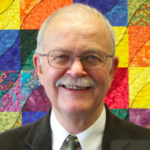For people living with mental or physical illness, as well as those who are grieving or struggling with problems in their lives, Christmas can be a difficult. The way one really feels is at odds with the message of the season to rejoice and celebrate. Instead of joy, one feels isolated and excluded, sadness is added to sadness.
Many churches are recognizing this and offering Longest Night, Winter Solstice, or Blue Christmas services, where those who are having a hard time with joy are invited to come and to have their true feelings acknowledged. This can make all the difference. Meeting people where they are is an act of respect, understanding, and compassion. It affirms that though you are struggling with the season, you are still valuable and still part of the community. This kind of acceptance won’t take away the sorrow, but it can be a step toward healing.
I remember one such service at a church I was serving In Minnesota. Preparing for worship on a bitterly cold longest night, I wondered if anybody would show up, if all the work of preparation had been for nothing. But as worship time approached, more and more people came into building, stomping off snow and removing multiple layers of coats and scarves, before heading into the sanctuary.
By the time we started, the congregation had grown to a good size, amazing for a service on a frigid week night and a clear sign that people felt a need to be there. Towards the end of the service, all worshippers were invited to come forward and to light a candle. The invitation to participate in the candle lighting was as inclusive as we could make it: Come and light a candle in honor of a loved one whose absence you are grieving. Come and light a candle in the hope for healing and recovery. Come and light a candle for a friend or loved one whom you know is struggling. Come and light a candle because you are a beloved child of God. Come and light a candle because there is nothing else that you can do right now.
Folks lined up and started to stream forward. The lights of the church were dimmed, so that as more and more candles were lit and placed in the sand filled trays in the front of the church, their combined glow became the bright center of the sanctuary. Sitting at the front of the church, watching the candle glow become brighter as more worshippers came walking slowly down the aisle, I had a powerful feeling that God’s Spirit was present with us. It was in the light of many candles, witness that we are not alone in our sorrow.
Where mental illness can isolate, leaving a person feeling alone just when they so badly need the care and support of others, this type of service unites and brings people together. Again it does this, not by denying reality, but by acknowledging pain and telling those who hurt that they are welcomed just as they are. This acceptance is a human reflection of the grace of God. On a cold winter night on the darkest day of the year, it brought the gift of healing.
As a pastor, I’ve used a lot of different communion liturgies over the years. The next time I officiate, whatever else I say, I’m going to end by inviting the “broken and hopeful” forward. I hope that the words will be as healing for them as they were for me.

Bob Griggs
Ordained in 1973, Bob Griggs has served UCC churches in Massachusetts, New Hampshire, and Minnesota. He is an Advisory Council member at Vail Place, a club house for people living with mental illness. He is also the author of A Pelican of the Wilderness: Depression, Psalms, Ministry, and Movies and Recovering from Depression: Forty-Nine Helps.
